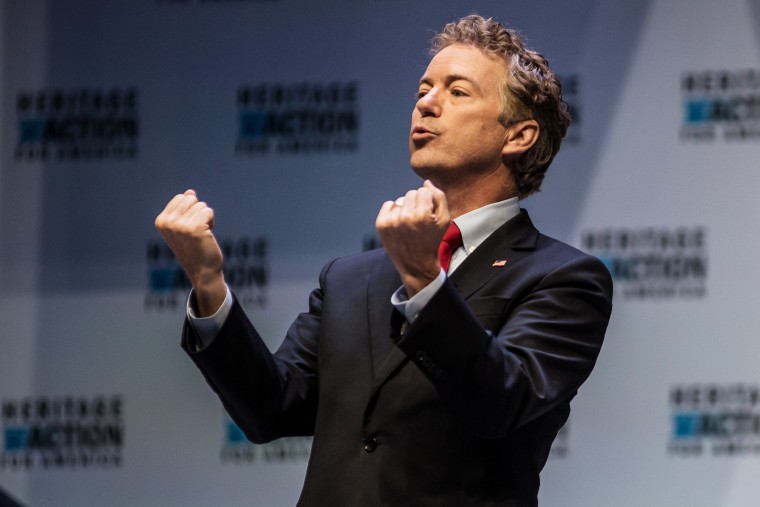After his fifth-place showing in the Iowa caucuses this week, Rand Paul told supporters, "We fight on! Thank you for all of your support."
The message seemed to suggest the Kentucky Republican would continue his longshot presidential campaign, though Paul apparently changed his mind soon after. This morning, the senator's campaign issued a press statement announcing the end of his candidacy. It read in part:
"Across the country thousands upon thousands of young people flocked to our message of limited government, privacy, criminal justice reform and a reasonable foreign policy. Brushfires of Liberty were ignited, and those will carry on, as will I. "Although, today I will suspend my campaign for President, the fight is far from over. I will continue to carry the torch for Liberty in the United States Senate and I look forward to earning the privilege to represent the people of Kentucky for another term."
The announcement comes as a bit of a surprise, in part because of what the senator said on Monday night, but also because Paul's support exists largely in the GOP's libertarian wing -- which exists in New Hampshire in ways it does not in Iowa.
But the combination of weak fundraising, low poll numbers, and a crowded top tier created hard-to-deny circumstances: Rand Paul simply did not have a path to the Republican presidential nomination. What's more, the Kentucky senator is the only 2016 candidate in either party who has a re-election campaign to think about this year, which created an added incentive to leave the race early and focus on the contest he's more likely to win -- just as party officials have been reminding him to do for months.
The question worth considering is why Paul failed so badly.
On paper, the idea behind the senator's national candidacy wasn't ridiculous. He parlayed his father's movement into a successful Senate race, and Rand Paul believed he could build on that base. What's more, the Kentuckian believed he could also benefit from a high media profile: before pundits and media insiders fell in love with Marco Rubio, they openly gushed at how "interesting" Paul was. Time magazine practically gave him a regular column.
As the presidential race got underway, polls showed the senator as a top-tier contender. Two years ago, The Atlantic published a piece with this memorable headline: "Rand Paul Is the 2016 Republican Frontrunner."
His fortunes went downhill from there.
So what went wrong? For one thing, Paul, in an attempt to broaden his appeal beyond his father's movement, started abandoning the qualities that made him so "interesting" in the first place. The strategy backfired: mainstream Republicans didn't believe him, and Paulites felt betrayed.
For another, the senator appears to have badly misread the national landscape. Paul believed the hype that the "Libertarian Moment" had finally arrived -- when it hadn't.
Looking ahead, Rand Paul is the first "major" candidate to exit the stage since Scott Walker's departure, and it may have some noticeable impact on the race. In New Hampshire, for example, the senator has poll support between 3% and 4%, which may not sound like much, but if those voters move towards one specific rival, it could have a meaningful impact on next week's primary results.
Right now, there's reason to believe Paul supporters would most likely gravitate to Ted Cruz, who will probably be spending the rest of the day reaching out to Paul's most notable backers, donors, and field organizers.
With Paul out, the GOP field now stands at 10 candidates, down from a high of 17.
Postscript: In retrospect, Rand Paul's willingness to pay for a Kentucky Republican Party presidential caucus probably wasn't a smart move.
